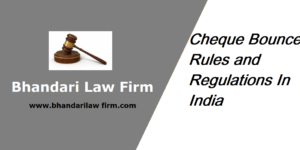Delay In Criminal Investigation Of A Case Is A Breach Of Fundamental Rights To Justice
Under Section 2 (h) of The Criminal Procedure Code, 1973; the investigation is a process conducted in order to collect evidence in a case by the police or any such other authorized person. It is non-judicial in nature. Delay In Criminal Investigation Breach Of Right To Justice
“Justice Delayed Is Justice Denied”
The highlights of this provision are as follows:
§ Investigation must be a process and not one act.
§ The intention is inclined or directed to collect evidence.
§ Such is conducted by the police or a private person but not by Magistrate.
It can be summarised to be a proceeding at the place where the offence is committed, and verification and establishment of the facts of the case and the circumstances under which it took place. It involves the gathering of materials to accumulate the evidence related to the commission of the offence. This is very articulately held in the case of H.N. Rishbud v. the State of Delhi, AIR 1955 SC 196.
In the case of State v. Pareshwar Ghosh;AIR 1968 Ori 20, the court held, that the term investigation refers to any process that involves sifting of materials or search of relevant data for the purpose of ascertainment of facts in issue in a matter in hand. Delay In Criminal Investigation Breach Of Right To Justice
In the case of Nalli Alias Nallianna Gounder vs The State, 1993 CriLJ 1409, the Madras High Court had to acquit a person accused of murder on the grounds that an “unexplained” and “inordinate” delay was there in dispatching the first information report to the Magistrate. Delay In Criminal Investigation Breach Of Right To Justice
In the case of Guman Singh v. State of Rajasthan, AIR 1970 Raj 173; it was held that before the commencement of the investigation, the Station House Officer and the investigating officer had received information from an unknown person about a murder. Thus, before commencing an investigation, it is necessary for the Magistrate to take cognizance of the offence. Delay In Criminal Investigation Breach Of Right To Justice
The delay in the investigation and prosecution of criminal cases that involve serious offences is a pitfall in the pillar of the justice system. The object of the criminal law and the societal interest of a welfare state in setting the criminal law in motion against the offenders within a speedy manner stands frustrated. The negative impact of such delay for the society at large is disheartening and beyond control. The faith in the criminal justice system is erased from the society and this starts to imbalance the society. Delay In Criminal Investigation Breach Of Right To Justice
The Constitution of India makes justice available to all the Indian citizens, they are guaranteed equal right to life and personal liberty without discrimination. The rule of law talks about all men are equal before the eyes of the law, have equal rights. However, the harsh reality is that unfortunately everyone cannot enjoy the rights equally as the enforcement of the rights are carried out finally through courts and the judicial procedure is very complex, costly and dilatory thereby putting the common man at a distance.
Our Constitution provides for the state to secure social, economic and political justice to all its citizens and makes way for the constitutional mandate for speedy justice inescapable under Article 14. It guarantees equality before the law and the equal protection of the laws. With Article 39A of the Constitution; the State is to secure the operation of the legal system a way that it promotes justice on a basis of equal opportunity and ensures that the same is not denied to any citizen by reason of economic or other disabilities further equal opportunity must be afforded for access to justice as its not sufficient that the law treats all persons equally, irrespective of the prevalent inequalities but the law must function in such a way that all the people have access to justice in spite of economic disparities.
The Supreme Court has time and again emphasized, through its judgement and has made clear that there can be no delay in the initiation of the trial, and that if done itself constitutes a denial of justice. Moreover, the directive principle of state policy entails the state to work for reducing inequalities amongst people under Article 39A of the Constitution; now while interpreting this provision it held that social justice includes ‘legal justice’ which means that the system of administration must provide a cheap and expeditious instrument for the realization of justice.
In an opinionated form of view, the failure of the criminal justice system in India to punish the criminals has now resulted in increased lawlessness, anarchy and decreased fear of the law in the Indian society. The right measures to influence the correct criminal investigation, would involve strengthening the police and forensic facilities and also improvising and incorporating specialised magistrates having exclusive and not just part-time investigative roles.
The process of investigation characterizes the nature of policing to a great extent and constitutes one of the most important occasion and for bringing the police and the public at large in contact. The process is not an indivisible whole but comprises of many interactional stages assuming different forms of contact appropriate to each.
(Read Here To Know About Our Criminal Litigation)
The Supreme Court in the case of Ganesh Narayan vs. S. Bangarappa, (1995) 4 SCC 41 held that “the slow-motion becomes much slower motion when politically powerful or high and influential persons figure as accused”. It emphasised that we should not be finical about the absolute processual equality but must be creative in innovating procedures compelled by individual circumstances.
The public interest being of supreme importance demands that the criminal cases especially those of serious crimes are covered within a reasonable time so that accused is proved guilty if so, convicted and are punished in the rightful proportion. Further, since one is free unless proven guilty concept exists in Indian law, on behalf of the accused the right to a speedy trial is once again claimed and can be called no less than a fundamental right. People get frustrated and give up hopes in the system when at every stage there is delay and the ends of justice are not met.
When deliberate attempts are made to delay the process politically or in any other way in some cases; with the continued passage of time, the evidence that is collected and preserved is concocted and tampered with. Oral evidence which in the majority of the cases is vital to the prosecution side takes a heavily concocted course. Hostile witnesses with faded memories or even changing statements with the long passage of time takes it to their benefit.
Therefore, the investigation can be called to involve the study of facts that are used to identify and locate, thereafter prove the guilt of an accused. A criminal investigation can include searching, interviews, interrogations, evidence collection and preservation and various methods of investigation
Author: This article was written by Richaa Mukhopadhyay, B.A. LLB(Hons), CS(executive), ALSK, ICSI, student of Amity Law School, Amity University, Kolkata.
Note: For any further information or any query you may contact us on 9855677966 or via email info@bhandarilawfirm.com



